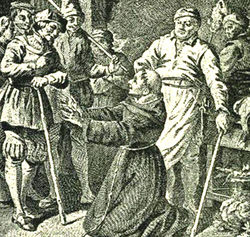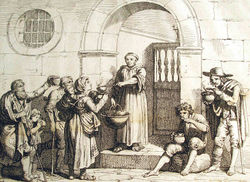Mendicant

Mendicant refers to begging or relying on charitable donations, and is most widely used for religious followers or ascetics who rely exclusively on charity to survive. The idea of a minister of the Kingdom of God appointed by Jesus who was the Christ to his called out ministers needing to beg from house to house[1] is contrary to the Doctrines of Jesus.
In principle, mendicant orders or followers do not own property, either individually or collectively, and have taken a vow of poverty, in order that all their time and energy could be expended on practicing or preaching their religion or way of life and serving the poor. But what people do not understand is that the vow of poverty is to simply help keep the ministers who come in one accord separate from the world.
When the Levites were the called out or Church in the Wilderness they were similar to the mendicant monks until the Golden calf was dismantled but they were given land that they held in common when they entered the promised land.
They were also given Breeches by the people.
When the ministers of Christ were sent out without purse for a season they were mendicant.
- Mark 6:8 And commanded them that they should take nothing for their journey, save a staff only; no scrip, no bread, no money in their purse:
- Luke 10:4 Carry neither purse, nor scrip, nor shoes: and salute no man by the way.

But later like the Levites who came out with little or nothing of their national right to the estate of the the Walled_camp of the Golden_calf they were allowed a purse.
- Luke 22:36 Then said he unto them, But now, he that hath a purse, let him take [it], and likewise [his] scrip: and he that hath no sword, let him sell his garment, and buy one.
So while all ministers may experience a certain training time with little or no purse God knows that ministers must also care for their families. The early Church ministers were almost always married and even appear as husband and wife teams. This is the way of God.
The ministers of God were not meant to be like some of the mendicant monks of the middle ages which evolved into little more than religious beggars like the ascetic sadhus of India. They wear their poverty as a badge of righteousness taking pride in their beggar status. Their poverty becomes their treasure and the purse of their true heart.
This displaying of humble poverty will not bear the fruitful nature of God's spirit and does little to strengthen the poor. The Vow_of_poverty is only an outward sign and personal discipline that helps govern the nature of Christ's Holy Church in faith and also helps the Church remain separate from the world.
It is the Spirit that giveth life.
Monks |
Minister |
Titular Servants |
Elder |
Deacon |
Bishop |
Overseer |
ordain |
appoint |
Orders |
Religious Orders |
Rules of St Benedict |
Married Monks |
Mendicant |
Lost Monks |
Monasticism |
Modern Monastic life |
Churches |
Levites |
Vow of poverty |
All things common |
Guidelines |
Liturgy |
Priests |
Eucharist |
Daily ministration |
Christian conflict |
Diocletianic Persecution |
Altars |
Fringes |
Breeches |
Red heifer |
Sabbath |